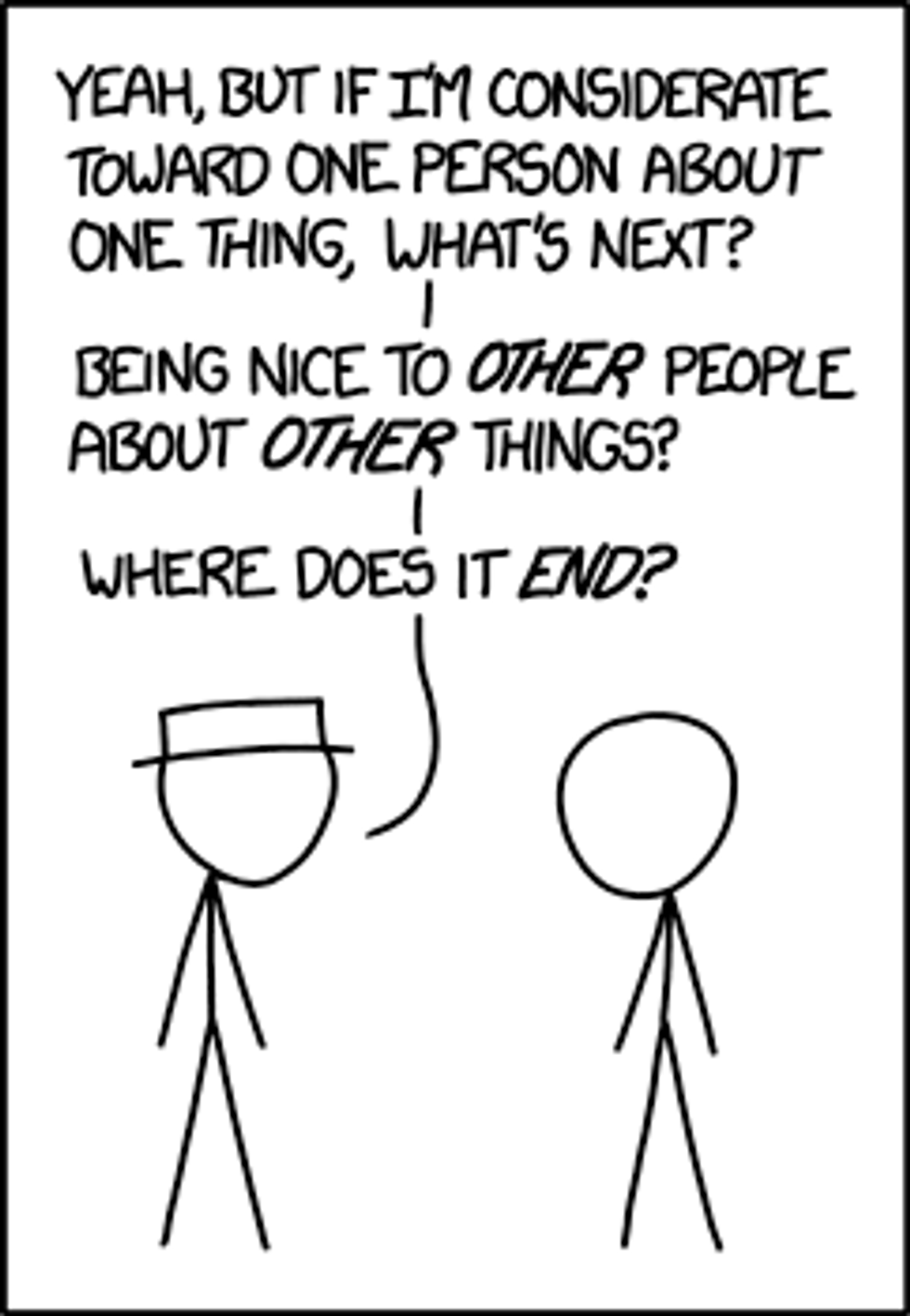"Progress is impossible without change, and those who cannot change their minds cannot change anything" - George Bernard Shaw
As a young man, like many middle-class white males on the internet, I looked at the internet and life with cynicism. I thought I had it all figured out. I figured that my fellow commenters on Digg (I'm old...) and Reddit were all so smart and had it all figured out. But as life goes on, people change. Sometimes. Not usually, but I managed a little bit of a shift.
It's All In The Middle Ground
In hindsight, this first error in judgement is a source of a lot of problems. It sounded so smart to me: "When faced with two conflicting opinions, the truth/best option lands in the middle." I remember way back in the early(-ish) days of the Iraq war, the arguments always seemed to circle around whether or not to pull out troops or not, whether it was about oil or not, whether torture was torture or not. Me being so enlightened about the world "understood" that this was obviously the best method to make decisions: Pull out of Iraq, but leave a small presence; oil was probably a factor, but not everything; some torture methods are wrong, but surely some aren't that bad. I got to feel good about myself for being smarter than everyone else, but still agree with everyone to some extent.
This kind of thinking breaks down so quickly once you begin to apply any kind of critical thought to it. "Slavery is wrong!" - "Slavery is great!" and in the middle-ground is: "Slavery is okay sometimes?" Some things aren't up to opinion. Some things are completely wrong and unacceptable, and we should be able to see and accept that.
Even worse - and more relatable - is when dealing with propaganda and false information. Let's say somebody tells you that - Just for example - there was a massive crowd outside, but evidence points to the contrary. A lot of photographic evidence. Then one should be willing to accept that the truth is clearly presented. There won't always be evidence of this kind, but the truth is always apparent.
Horseshoe Theory
(Note, I have not studied politics, so details may be wrong.)
Horseshoe Theory basically states that the political extremes start to resemble each other as you get further and further from the middle, so that it looks less like a spectrum and more like a horseshoe. On the surface, this made sense to me. Seeing how aggressively the left and right held their stances, I got to feel superior to both of them by accepting that they were acting exactly the same way. They both call each other Nazis, say that the other side is destroying the world, politicians on both sides are corrupt and evil. Being so inundated with rhetoric and attacks of the left and right, I started to see how clearly they were all the same. When I first read about horseshoe theory, I had that moment of "Aha! Somebody put it to words!" but of course, the resemblance the two sides have will break down rather quickly.
The first question to ask would be "what are the extremes of the left and right?" Most would say that the far left would be socialism and far right would be populism or nationalism. That would be only kind of correct (in terms of mainstream America), but for arguments sake lets roll with it. Socialism means that the means of production are spread among the population (it's more complicated than that, but bear with me). Nationalism revolves around a central identity with the nation you live in, and supporting its sovereignty (once again, more complex than that). Just looking at minimal definitions, one can see that they have little to do with each other in their basic ideological descriptions. If you go even further politically, you find Anarchism and Fascism, which are so diametrically opposed that I'm not sure how one can make the mistake of comparing them.
Ultimately, Horseshoe theory comes from the same self-aggrandizing thinking as the middle-ground. And fails in much the same way.
Slippery Slope
The Slippery Slope Fallacy is easy enough to see as a bad argument. The classic example is "If we let gay people marry, what's to stop cats and dogs from marrying!" But obviously that makes little sense. Cats and dogs can't say "I do." But this argument comes up more and more in different ways. The one I've seen most often lately is how it relates to free speech.
Of course, as a young internet cynic, I felt that free speech is a bastion of safety. I can say whatever I want without worrying, and that's my constitutional right. But many proponents of free speech will decry anything they see as an attack on this last bastion of safety, warning that "If we ban one kind of speech, what's to keep them from going after more and more!" As with all politics, there is nuances to this, but I think that falling on a warning of "more to come" is just bad reasoning.
Many are protecting the Alt-Right and other Fascist/Nazi-ist movements, saying that we cannot ban or silence them on the grounds of how this would degrade the first amendment (Hallowed be its name.) At one point in my life, I would likely have agreed wholeheartedly, but at this point in my life I'm not so sure.
Cyber-bullying, verbal abuse, and threats of violence and the like are all similarly illegal, but we have not seen them impede our ability to call each other rude names on message boards. Of course, these are all very dangerous, leading to suicide, and violent or vengeful reactions. One could quite clearly make the same argument for much of the Neo-Nazi rhetoric, in the way they call for ethnic segregation or "peaceful cleansing."
Now, I will admit that this is difficult. I can't say that I fully oppose those that say that the first amendment may come under attack. It already is under enough strain, as news agencies are threatened by domineering presidents and dictators. We can see how dangerous it is to lose our right to free speech as people in China, Saudi Arabia, and Russia all find themselves in danger every day. But we can also see that Trump's strongest supporters question whether People of Color are actually people, whether or not Jews control the world, and cite the "cucking" of the world (Shakespeare must be rolling in his grave.)
In short, these worldly arguments are difficult to grapple with. Don't handicap your grip on them with bad ways of thinking.






















